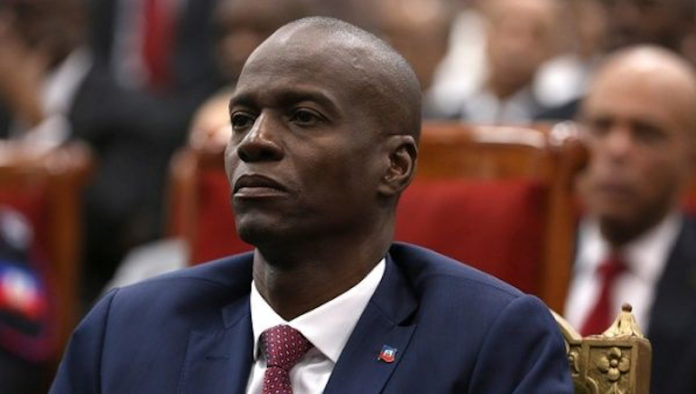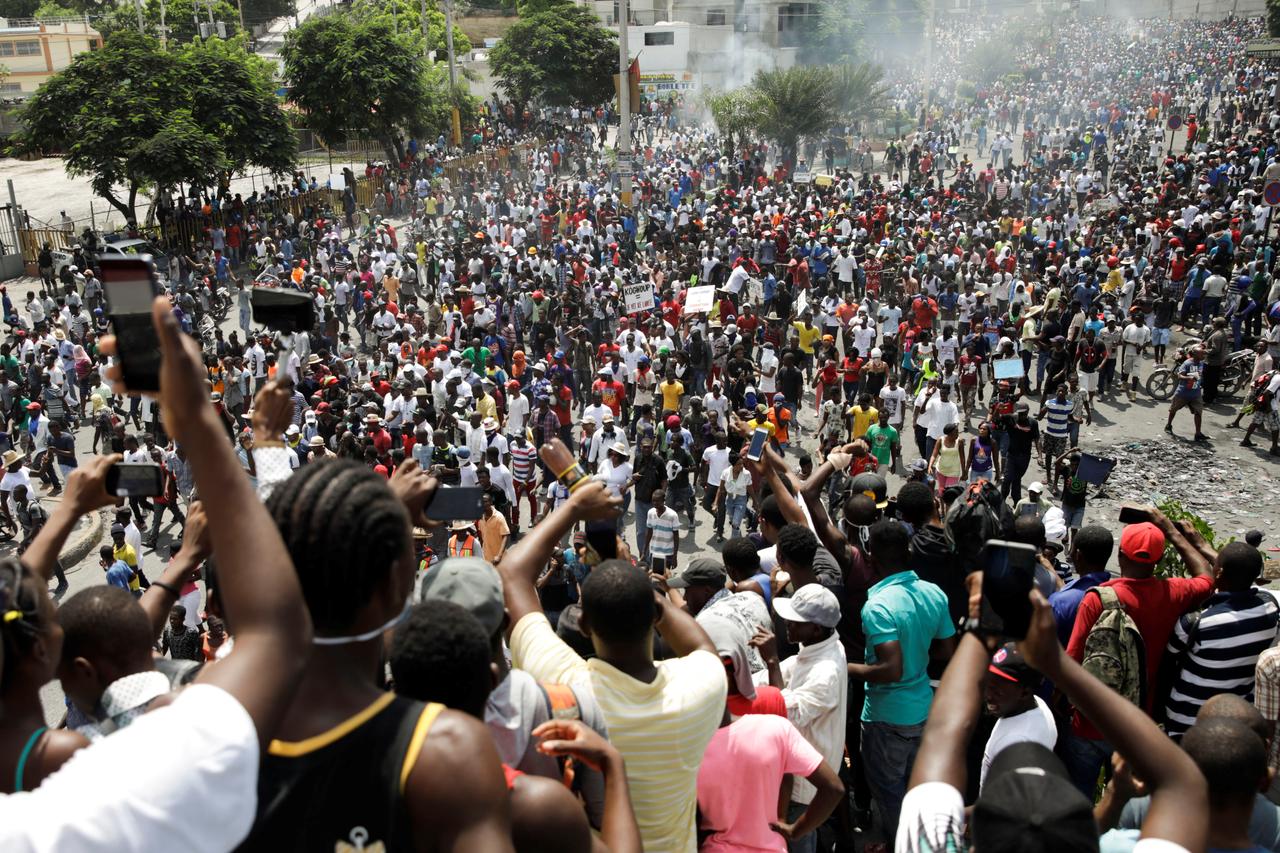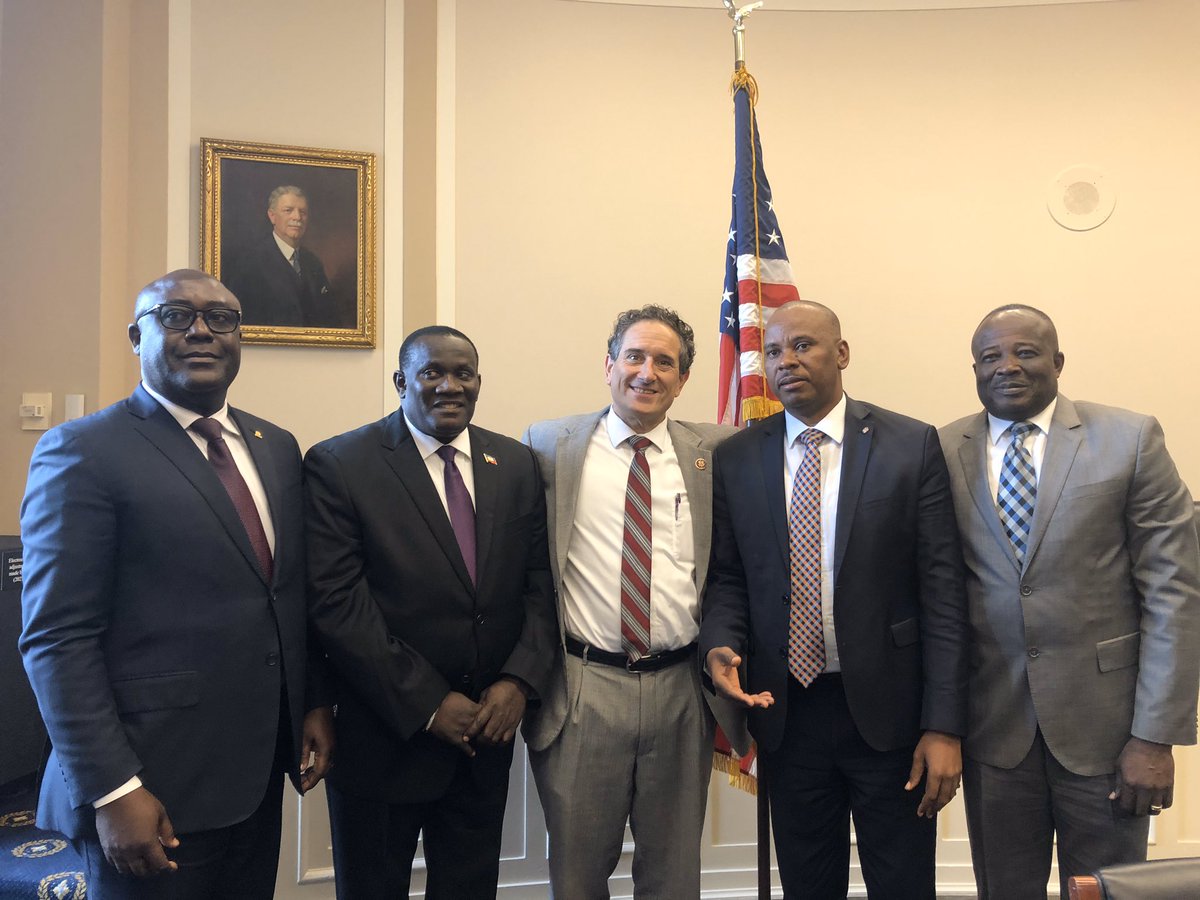
In the political crisis that has rocked Haiti for three months, the opposition is exhorting the masses to keep up the difficult struggle to chase President Jovenel Moïse from power, while the President clings obstinately to his chair in the National Palace against all odds. Both sides show no signs of throwing in the towel, and, sooner or later, it appears that one will end up knocking out the other.
The opposition has found inventive strategies to continue mobilizing as many people as possible in its fight against the regime, but what surprises many are the methods used by the president to create diversion and to pretend he maintains control of the state apparatus. Some outsider who does not monitor the flow of information disseminated by social networks and who, by chance, came across the interview that President Jovenel Moïse gave to two journalists of Radio Metropole on Mon., Oct. 28, 2019 on the Haitian political situation might have believed that all is well in Haiti, except for some events here and there led by annoying people who sometimes have anti-government mood swings.
I was surprised, even astonished, by the calmness with which the President of a country, which has burned in every sense of the word for more than three months, responded to the more than complacent questions of these journalists who, in reality, did not wish to leave the confines of the editorial line of the station for which they work. Wendell Theodore and his colleague were indeed worthless in the way they conducted the interview with the head of state. They were on a appointed mission, so they fulfilled their mission. Period!
according to Jovenel, it is a simple problem of the “System” that should be solved in a few days’ time if we follow his reading of the conflict…
For Jovenel Moïse, he acts as if the country is not going through an acute crisis for which he is principally responsible. Moreover, he seems to say, since everyone says that there is a crisis in Haiti and that the country is in chaos where everything, absolutely everything, is blocked, then he will take or has already taken steps to remedy this situation. Still, according to him, it was a simple problem of the “System” that should be solved in a few days’ time if we follow his reading of the conflict, pitting him, not against the entire Haitian population, but only against some individuals who claim to be the opposition.
A curious understanding of this ongoing crisis! According to President Moïse, it is enough to denounce two or three private electricity suppliers in Haiti – in this case SOGENER, HAYTRAC and E-POWER – for economic activities to resume, for schools to reopen their doors, and, in short, for the population to return to its business. Indeed, while listening to or reading the messages of the Secretariat of State for Communication of the doubly resigned government of Prime Minister Jean Michel Lapin, whose exact status is unknown (but clearly it’s irrelevant), it is understood that various measures have been taken to restore calm, security, and even tranquility in a country where you have to be deaf and blind to not see and hear the din of people from everywhere nowadays, which will stop at nothing to get the resignation of the President Moïse. However, it seems that Moïse thinks his term will end in 2022. But his contract with the Haitian people was terminated for failing to keep his promises, although he swears on his life and on the life of his family that he will abandon his post only between four pieces of board.

To justify this radical and senseless position, President Jovenel Moïse, after being in hiding for a long time during the popular protests, has now become motivated and, curiously, is multiplying his media statements. After a first catastrophic taped address to the nation aired on Sep. 25 at 2 a.m., a few days later, he held a press conference in the National Palace gardens, a way to demonstrate to his opponents that he is “still alive” and still very present in this mythical place. These two addresses, however, gave no satisfactory result given the President’s difficulties in justifying his refusal to give up power, so the opposite happened. He in fact sparked a wave of criticism and at the same time revived the opposition and the protesters who understood how obstinate Jovenel Moïse was.
Since his night-time address, in which he said nothing consistent, and his press conference, which proved to be a kind of provocation for the opposition and the thousands of demonstrators, Operation “Country Lock” has grown and now the entire nation seems hell bent on ousting his regime. Noting that nothing was accomplished through these desperate attempts pantomime state business through ceremonies just to receive the credentials of ambassadors of some countries who have never understood anything about the Haitian people’s struggle and while educating, it seems, senior officials to take measures to relieve the misery of the population demonstrating against him, before organizing a meeting with all the authorities responsible for “security” and especially repression against the protesters, in particular the CSPN (Superior Council of the National Police), the Delegates and Deputy Delegates (Prefects), the Departmental Directors of the National Police, etc., Jovenel Moïse, whose interviews with journalists remain a scarce commodity, very rare, decided to respond favorably to a request for an interview from Radio France International’s correspondent in Port-au-Prince, Amélie Baron.
Thus, in a long interview with this foreign media, Jovenel Moïse tried to justify and even explain the reasons that motivate him not to resign. According to him, his early departure would mean civil war, at least a war between various opposition factions which, according to him, will never manage to agree on the sharing of power. For the President, his five-year term is not negotiable. And for good reason. Those who want his skin are the beneficiaries of what he calls the “System”, not necessarily the millions of protesters. Those who, for decades, made their butter with lucrative contracts on the back of the Haitian state, those are the bloodsuckers that today want his departure. Thus, his answer to multiple calls to resign is “No.”
Moïse now won’t be able to even get an exit with dignity and respect.
It must be said that long before his interview with Amélie Baron, Moïse had discovered this angle of defense. In the very first interview he gave to the Miami Herald a few weeks ago, he had already accused the “System” and its agents of leaving the country in this state of misery and absolute poverty. According to him, it is a minority that wants his resignation but not the people, as the opposition claims. It is by “following his look” (as he said in his Palace garden press conference) that we must try to recognize these beneficiaries of the “System.” Cautious, clever, or cowardly, the Head of State categorically refuses to mention the names of those who instituted, organized, and generated the “System” which, since Emperor Jean-Jacques Dessalines’ assassination in 1806, royally ignores the masses. Although he has conjured up a scapegoat and anonymous designers of the “System”, the population does not intend to let go. Worse, other sectors, it seems, of the “System” have joined the mobilization that is only growing in intensity.
Moïse’s communication strategy is going badly and the line of defense of making the “System” responsible for his bad governance and catastrophic presidency also does not hold. After an intervention on the National Television of Haiti (TNH), two interviews in foreign media, and a press conference, the President still cannot convince anyone that his presence as the head of the State is the guaranty of political stability. Worse, Jovenel Moïse’s media outlets are provoking more criticism and pushing more people into the streets, which can be considered a dilemma. However, by taking this position of an intransigent who refuses to resign his post, the President is playing with fire. The more the days and the weeks pass and the country continues to be under the control of the protesters without the regime being able to take again control of the situation and institutions, it is his government which sends the image of an ungovernable country, sinking into violence and a state in disarray. For the moment, no one sees how the President’s communication strategy has served anything but to make him appear as the last of the Mohicans in a war that he will sooner or later end up losing.
Just read the notes of some human rights organizations on the attitude of law enforcement officers towards protesters and the latest press releases from U.S. authorities or listen to the statement by Jon Piechowski, the U.S. State Department’s Deputy Under Secretary of State for the Western Hemisphere, on the Voice of America (VOA) in Creole to understand that lines are moving. President Jovenel Moïse should be wary of these communiqués and diplomatic statements from Washington on the political situation in Haiti. In general, the American authorities do not speak much about Haiti, except when they understand that its political and social situation has begun to escape them; this has been the case for some time. So, President Jovenel Moïse’ ubiquitousness may be starting to annoy them.
Moïse now won’t be able to even get an exit with dignity and respect. We should not expect a decline in pressure from the opposition, which, for its part, does not intend either to pause in the fight it is about to win despite the President’s resistance and obstinacy to remain at the country’s helm. As we have seen, for the moment the path chosen by the regime’s team is far from giving the results it hoped for. In fact, the opposite has happened. None of Jovenel Moïse’s four speeches softened or baffled the opposition and the protesters. The tense confrontation continues.
In recent weeks, we’ve seen differences emerge between the leaders of the so-called radical and moderate opposition. Clearly, among the opposition’s various branches, there is one which opts openly for head-on confrontation with the regime. This is the one led by lawyer André Michel who, in press conference after press conference, calls on the population to maintain pressure by all means necessary on President Jovenel Moïse. For this spokesperson of the Democratic and Popular Sector (SDP), there is only one way for the regime will listen to the people’s demands: their demonstrations must be muscular and even have collateral damage.
Damage is caused when demonstrations pass anywhere – in Delmas, Pétion-Ville, or downtown Port-au-Prince – provoking strong reactions and criticism against the regime. These criticisms target the President as being responsible for this damage because of his stubborn refusal to yield to the protesters’ demands. The attacks on the French and Canadian embassies by the protesters are a blessing for the regime’s opponents since these actions push the Haitian authorities to apologize to the countries concerned. However, it is never good for a regime already in political difficulty to find itself obliged to apologize to foreign states for acts committed by its nationals. In the meantime, the hardliners call for intensifying the mobilization while leaving an atmosphere of psychosis among those who would be tempted to come to the regime’s rescue. Meanwhile, some opposition leaders continue to sell abroad their struggle against President Jovenel Moïse.
That’s how four opposition leaders were found in Washington, DC last week seeking recognition and support from President Donald Trump’s administration. As the weeks go by, some have begun to question the support provided by the U.S. government to Jovenel’s regime. Nènel Cassy, himself a member of the delegation which also included the former Senator and Speaker of the National Assembly, Simon Dieuseul Desras, Senator of the Northwest Evalière Beauplan, and Rony Colin, Mayor of the commune of Croix-des-Bouquets and CEO of Radio and TV Zenith, a station playing the role of spokesman of the radical opposition against the regime. We learned that this quartet was in Washington in order to explain their opposition to the Tèt Kale regime. It should be noted that this is not the first visit of Haitian opposition leaders to Washington as part of their plan to overthrow President Jovenel Moïse.

This time, the larger opposition seems to be opting for synergy to reach their goal. Since the moment when the four opposition leaders began their pilgrimage to the U.S., the mobilization in the Haitian capital moved to a higher level. This is an agenda of actions that was unveiled by SDP leader André Michel, on Wed., Oct. 30 with a major event of the hospital sector until Tue. Nov. 5, 2019 with the operation “Mete lòd nan dezòd” (Put order in disorder). This operation consisted, according to lawyer André Michel, of putting a hand on the collar of all of Jovenel Moïse’s ministers and Directors General in order to seize their official vehicles and to take them to the nearest police station.
In short, a way to spread panic within the Moïse Administration. Finally, when everyone in the opposition seems to be playing their specific role after a period of mistrust and mutual oversight, the two commissions formed to organize the handover of power were about to reach an agreement to allow a joint meeting with President Jovenel Moïse. Indeed, after the Civil Society Facilitation Commission, commonly known as the “Gateway” (Passarelle), had to meet many people from different sectors committed to finding a way out of the crisis, including foreign diplomats stationed in Port-au-Prince, after the steps of the Consensual Alternative for the Refounding of Haiti (ACRH) which has already set up a Commission for the Facilitation of Changing Power, the two parties intend to bring out a unitary decision in which President Jovenel Moïse could find an exit door.
Professor Lémète Zephyr, spokesperson for the “Passerelle”, and former parliamentarian Hugues Célestin, his counterpart of the Commission for the Facilitation of Changing Power led by Mr. Gervais Charles, had agreed to meet in order to discuss the only real problem that exists between the two opposition organizations. Indeed, between the ACRH’s Commission of Handover and the Gateway’s Commission for Facilitation of the Civil Society, there is only a disagreement on the modality of replacing President Jovenel Moïse to ensure the transition. According to the former deputy Hugues Celestin, for his organization, the question is simple: it is a Supreme Court judge who should assume the provisional presidency in the company of a prime minister from the opposition. But for the Gateway’s Professor Lémète Zephyr, the case is not so simple. According to him, some judges of the highest Haitian court had not been appointed in a regular way, that is to say according to the law.
Despite this significant divergence between the two opposition organizations, both of which are calling for Moïse’s resignation, the two spokesmen believe that they will find an agreement as soon as possible on the president’s replacement. The two leaders remain convinced that it is important for the organizations to meet all the protagonists, including the leaders of the PHTK and President Jovenel Moïse to present to them the plan for the end of the crisis that the two Commissions have produced. Finally, the opposition has revealed a list of three names of the Supreme Court judges among which the larger opposition will choose by vote whoever occupies the presidential chair until the inauguration of a President of the Republic elected. These judges are Mécène Jean-Louis, René Sylvestre, and Ivickel Dabrévil, one of them will be elected by the nine members of the Commission of Handover, led by lawyer Gervais Charles.
In the meantime the Commissions continue to work on their own in order to achieve something realistic and acceptable for all actors, including, it seems, the U.S.-aligned embassies represented by “the Core Group.” In the meantime, President Jovenel Moïse can rely on his specialized police forces among other USGPN (General Security Unit of the National Palace), CIMO (Intervention Corps for Maintaining Order), UDMO (Departmental Unit for Maintaining Order) and BOID (Brigade of Operation and Intervention Departmental) to clear the roads with large bursts of automatic weapon and tear gas used in profusion on the protesters to allow him to access his office, like in the incredible scenes that we saw on Thu., Oct. 31, 2019 in the area of the Champs de Mars, a stone’s throw from the National Palace. In short, in Haiti the political crisis continues.









